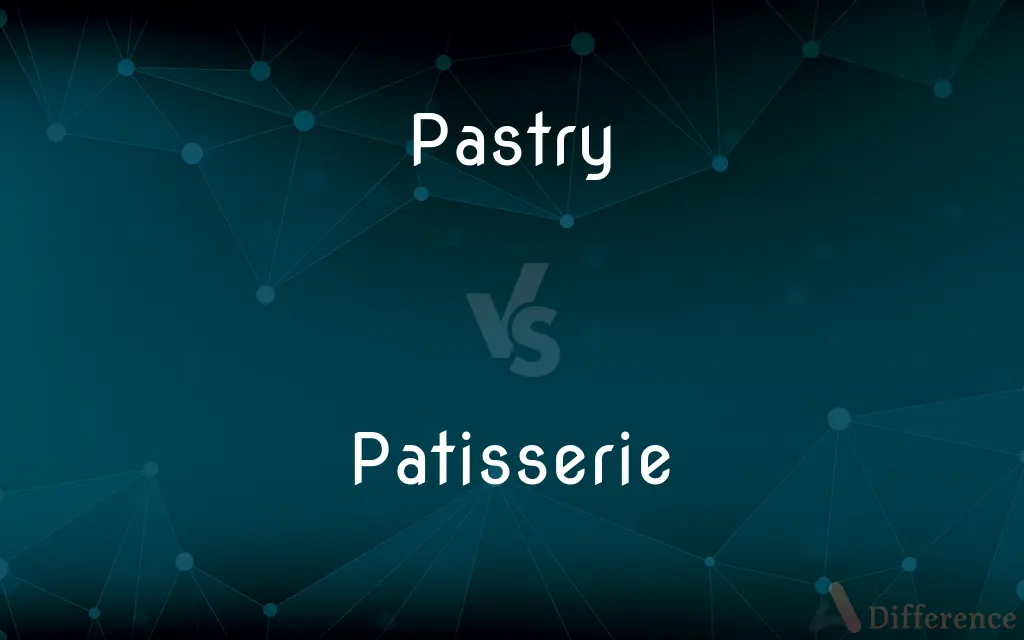Pastry vs. Patisserie — What's the Difference?
By Tayyaba Rehman & Fiza Rafique — Updated on April 4, 2024
Pastry refers to a dough made from flour, water, and fats, used as a base for baked goods, while patisserie denotes French-style bakeries and the refined pastries they produce.

Difference Between Pastry and Patisserie
Table of Contents
ADVERTISEMENT
Key Differences
Pastry is a fundamental component in the baking world, primarily made by mixing flour, water, and fats to create a versatile dough. This dough can be sweet or savory and is the foundation for a variety of baked goods. On the other hand, patisserie, a term deeply rooted in French culinary traditions, refers not only to high-quality, sophisticated pastries themselves but also to the establishments that specialize in making and selling these delicacies.
The term pastry encompasses a wide range of baked products, including pies, tarts, and croissants, which are known for their flaky or crumbly textures. These textures are achieved by layering dough and fat to create air pockets that puff up during baking. Whereas patisserie items are often intricate and elaborately decorated, emphasizing not just flavor but also presentation and artistry. Such items include éclairs, macarons, and mille-feuille, celebrated for their finesse and complexity.
In the context of culinary education and profession, pastry chefs (pâtissiers) are specialists who have mastered the craft of pastry making, which includes a broad spectrum of products. Patisserie, however, specifically denotes the expertise and establishments dedicated to the refined art of French pastry making, highlighting a narrower, more specialized subset of skills and products that are typically French in origin.
While pastry making is a skill that can be developed at home or in various culinary settings, patisserie suggests a higher level of specialization. The creation of patisserie items often requires advanced techniques, precision, and creativity, and is usually learned through formal education or apprenticeship in the field of French baking and pastry arts.
Pastries are enjoyed worldwide in various forms and are a staple in many countries' cuisines. Patisserie, while also enjoyed globally, is specifically associated with French culinary tradition and is often perceived as a luxury or specialty item, reflecting the elegance and sophistication of French baking.
ADVERTISEMENT
Comparison Chart
Definition
A type of dough used for making baked goods.
French-style pastries and the establishments that sell them.
Types
Pies, tarts, croissants.
Éclairs, macarons, mille-feuille.
Focus
Ingredient and base for various dishes.
Artistry, sophistication in baked goods.
Skill Level
Broad range, from basic to advanced.
Often requires specialized, advanced techniques.
Cultural Association
Global, with variations across different cuisines.
Specifically associated with French cuisine and luxury.
Compare with Definitions
Pastry
Used to describe the texture of baked goods.
The pastry was perfectly flaky and light.
Patisserie
Refers to the high-quality pastries themselves.
The patisserie displayed an exquisite selection of cakes.
Pastry
The category of baked goods made from this dough.
The bakery offers a wide variety of pastries.
Patisserie
Denotes the skill of making sophisticated French pastries.
She excels in patisserie, especially chocolate desserts.
Pastry
Reflects a culinary tradition.
Pastry making is an essential skill in many cuisines.
Patisserie
Symbolizes French culinary artistry and elegance.
The patisserie's interior was as elegant as its desserts.
Pastry
Can refer to the art of making baked goods.
He studied pastry at culinary school.
Patisserie
A French bakery specializing in refined pastries.
They visited a patisserie to buy macarons.
Pastry
A dough made from flour, fat, and water.
She rolled out the pastry to make a pie crust.
Patisserie
Represents a specialty within baking.
Patisserie items are known for their intricate designs and flavors.
Pastry
Pastry is a dough of flour, water and shortening (solid fats, including butter or lard) that may be savoury or sweetened. Sweetened pastries are often described as bakers' confectionery.
Patisserie
A bakery specializing in French pastry.
Pastry
Dough or paste consisting primarily of shortening or another fatty substance mixed with flour and water, often baked and used as a crust for sweet foods such as pies and tarts.
Patisserie
(UK) a shop that sells pastries and cakes
Pastry
Baked sweet foods made with pastry
Viennese pastry.
Patisserie
(obsolete) pastry
Pastry
One of these baked foods.
Patisserie
Pastry.
Pastry
(Informal) A sweet baked good.
Patisserie
A shop selling mostly pastries; a pastry shop.
Pastry
(countable) A baked food item made from flour and fat pastes such as pie crust; also tarts, bear claws, napoleons, puff pastries, etc.
That pastry shop sells not just pastries, but all kinds of baked goods.
Patisserie
A bakery specializing in French pastry
Pastry
(uncountable) The food group formed by the various kinds of pastries.
That pastry shop sells not just pastry, but all kinds of baked goods.
Pastry
(uncountable) The type of light flour-based dough used in pastries.
Pastry
A place where pastry is made.
Pastry
(uncountable) The act or art of making pastry.
He learned pastry from the great Gaston Lenôtre.
Pastry
Desserts of all kinds, whether or not these incorporate the baked item made from flour and fat, or that section of a kitchen that prepares these.
I used to work in the fish section, but now I've been moved to pastry.
Pastry
The place where pastry is made.
Pastry
Articles of food made of paste, or having a crust made of paste, as pies, tarts, etc.
Pastry
A dough of flour and water and shortening
Pastry
Any of various baked foods made of dough or batter
Common Curiosities
Do you need to be a pastry chef to work in a patisserie?
Working in a patisserie often requires specialized training in French pastry arts, which a pastry chef might possess.
Can a patisserie sell items other than pastries?
While primarily focused on pastries, some patisseries may also offer a selection of breads and other bakery items.
What is the main difference between pastry and patisserie?
Pastry refers to the dough and its related baked goods, while patisserie denotes sophisticated French pastries and the bakeries that specialize in them.
Are all pastries considered patisserie?
Not all pastries fall under the category of patisserie; patisserie refers specifically to refined French pastries.
Is patisserie more expensive than regular pastry?
Yes, patisserie items are often more expensive due to their complexity, artistry, and the quality of ingredients used.
What skills are necessary for making patisserie?
Precision, creativity, and an understanding of advanced baking techniques are key.
Why are patisserie items considered luxurious?
Their intricate designs, delicate flavors, and the skill required for their creation contribute to their perception as luxury items.
What makes a pastry chef different from a pâtissier?
A pastry chef may have a broader range of skills across various baked goods, while a pâtissier specializes in the art of French pastries.
Can vegan or gluten-free options be found in patisserie?
Modern patisseries may offer vegan or gluten-free options, catering to a wider range of dietary preferences.
Is it possible to make patisserie-style pastries at home?
While challenging, it is possible with the right skills, techniques, and ingredients.
How do cultural perceptions of pastry and patisserie differ?
Pastry is universally recognized and varies by culture, while patisserie is specifically esteemed as a symbol of French culinary sophistication.
Can patisserie refer to a type of dessert?
Yes, it can refer to the specific, high-quality French desserts sold in such establishments.
How important is presentation in patisserie?
Presentation is crucial in patisserie, with a strong emphasis on elegance and detail.
What distinguishes a patisserie from a regular bakery?
A patisserie specializes in French pastries, focusing on quality and artistry, while a bakery may offer a wider range of breads and baked goods.
Are there schools specifically for patisserie?
Yes, there are culinary schools that offer specialized programs in patisserie and baking arts.
Share Your Discovery

Previous Comparison
Enchilada vs. Empanada
Next Comparison
King vs. PresidentAuthor Spotlight
Written by
Tayyaba RehmanTayyaba Rehman is a distinguished writer, currently serving as a primary contributor to askdifference.com. As a researcher in semantics and etymology, Tayyaba's passion for the complexity of languages and their distinctions has found a perfect home on the platform. Tayyaba delves into the intricacies of language, distinguishing between commonly confused words and phrases, thereby providing clarity for readers worldwide.
Co-written by
Fiza RafiqueFiza Rafique is a skilled content writer at AskDifference.com, where she meticulously refines and enhances written pieces. Drawing from her vast editorial expertise, Fiza ensures clarity, accuracy, and precision in every article. Passionate about language, she continually seeks to elevate the quality of content for readers worldwide.
















































